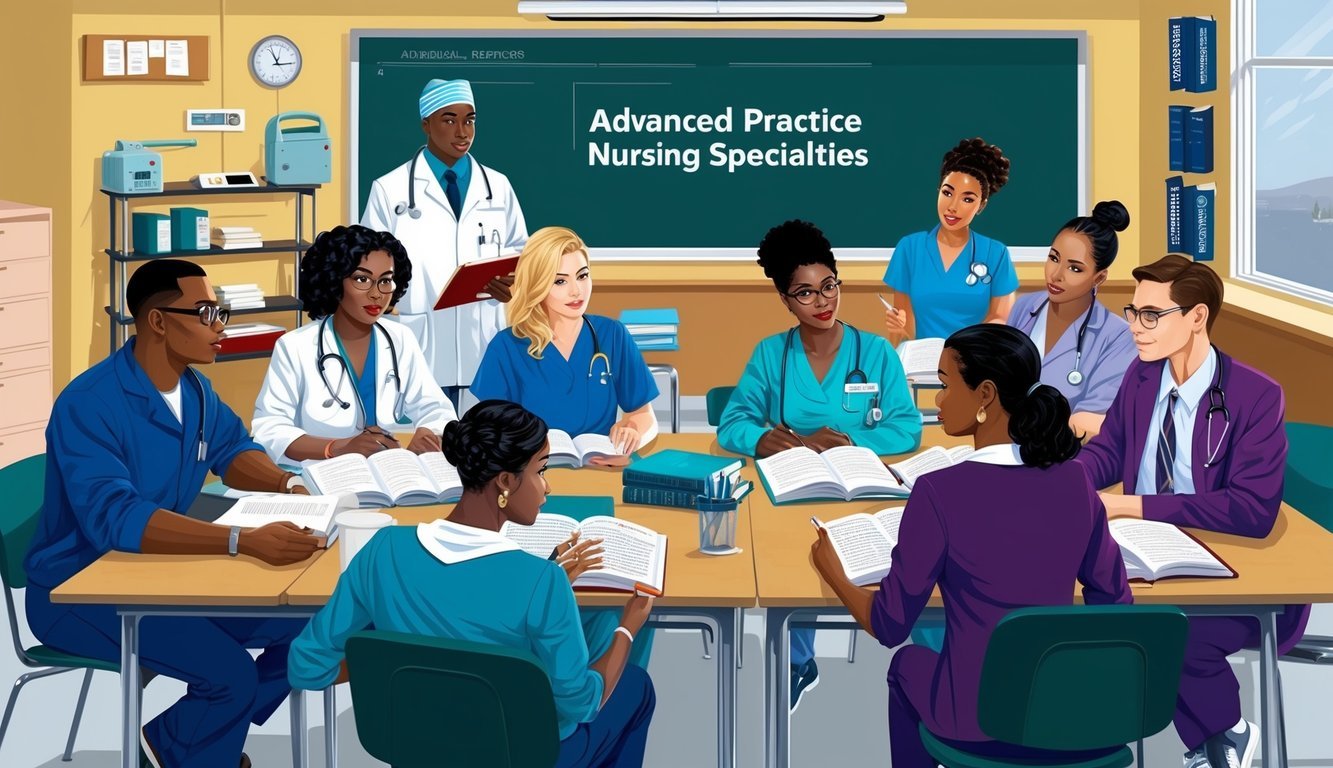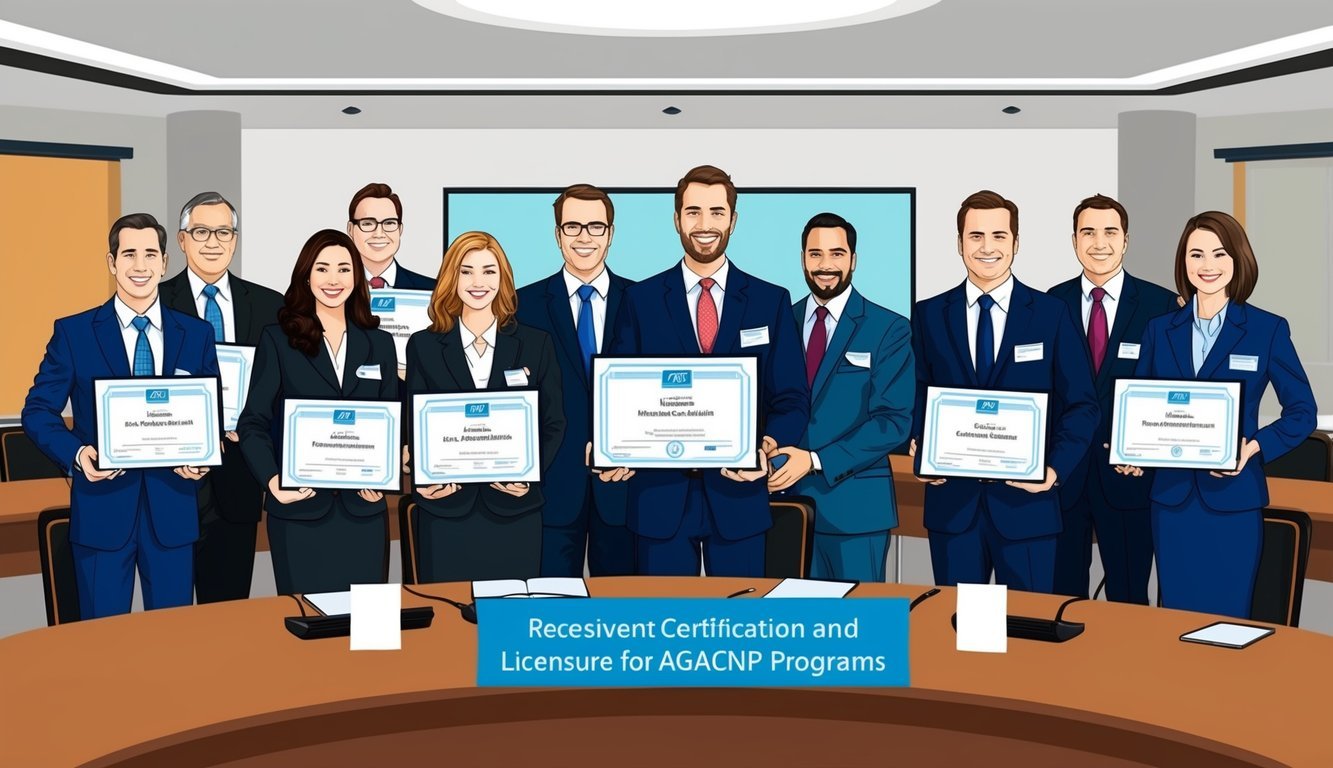As you explore the world of advanced nursing practice, AGACNP programs offer a pathway to specialize in adult gerontology acute care.
These programs are designed for registered nurses who seek to enhance their clinical competencies and broaden their career opportunities. The AGACNP track equips you with the skills needed to provide high-quality care to adults with acute and complex medical conditions.
In choosing a program, you can find options that cater to various schedules, including full-time and part-time courses.
Many universities, such as UConn’s AGACNP and Baylor’s Online DNP, offer flexible online formats that enable you to balance your studies with other personal and professional commitments.
Additionally, certification through these programs positions you as a valuable asset in the healthcare field, enhancing your credentials and job prospects.
By pursuing an AGACNP program, you are stepping into a vital role where your expertise can make a significant difference in patients’ lives.
Overview of AGACNP Programs
AGACNP programs prepare you to become an Adult-Gerontology Acute Care Nurse Practitioner, focusing on advanced care for adults with complex health needs.
These programs emphasize rigorous education and training, ensuring you meet the high standards of the healthcare profession.
Defining AGACNP
The Adult-Gerontology Acute Care Nurse Practitioner (AGACNP) role centers on caring for adult patients with acute and chronic illnesses.
AGACNPs work in diverse settings such as hospitals, intensive care units, and specialty clinics, handling complex patient situations.
These professionals assess, diagnose, and manage treatment, collaborating closely with healthcare teams.
They play a crucial role in improving patient outcomes and can lead treatment plans focused on older adult populations.
Role and Scope of Practice
Your role as an AGACNP involves several key responsibilities, including:
- Conducting comprehensive assessments
- Ordering and interpreting diagnostic tests
- Developing treatment plans
- Performing procedures such as central line placements
AGACNPs also educate patients and families about health issues, promoting self-management and preventive care.
They must adhere to state regulations and practice within their scope, which may vary.
Education and Accreditation
To become an AGACNP, you typically need to earn a master’s or doctoral degree in nursing.
Programs should be accredited by recognized bodies, such as the Commission on Collegiate Nursing Education (CCNE) or the American Association of Colleges of Nursing (AACN).
The curriculum often includes both theoretical coursework and clinical practice, ensuring you gain the skills needed for effective patient care.
Additionally, you’ll need to pass a national certification exam to practice as an AGACNP, solidifying your qualifications in this specialized field.
Admission Requirements and Prerequisites
Understanding the admission requirements and prerequisites for Adult-Gerontology Acute Care Nurse Practitioner (AGACNP) programs is essential.
These programs typically demand a combination of educational qualifications, clinical experience, and specific application materials.
Educational Background
To qualify for an AGACNP program, you must possess a baccalaureate degree in nursing from an accredited institution.
This degree ensures you have foundational knowledge and skills critical for advanced practice nursing.
Many programs require you to have completed specific coursework, which may include:
- Pathophysiology
- Pharmacology
- Health Assessment
Some institutions may also accept applicants with an associate degree in nursing if they have completed an RN-to-BSN program.
A minimum cumulative GPA of 3.0 or higher is common among many schools.
This academic performance reflects your ability to handle graduate-level coursework effectively.
Licensure and Clinical Experience
Possessing a valid RN license is a non-negotiable requirement for AGACNP programs.
This license proves that you have met the standards established by your state’s board of nursing.
In addition to licensure, you typically need clinical experience.
Most programs require at least one year of full-time nursing experience in a relevant setting.
This experience is crucial as it ensures you have practical skills in patient care.
For international students, additional requirements may include proof of English proficiency, evaluated transcripts, and sometimes a visa.
Familiarizing yourself with these specifics can aid in a smoother application process.
Application Materials
When applying to an AGACNP program, you will need to submit several key application materials:
-
Personal Statement: This statement should outline your career goals, motivations for pursuing an AGACNP, and relevant experiences.
-
Resume or CV: Detailing your professional and clinical background is essential.
-
Letters of Recommendation: Generally, two or three letters from academic or professional references are required.
-
Official Transcripts: These should be from all post-secondary institutions you attended.
Pay attention to specific requirements provided by each program, as they may vary.
Ensuring you have all necessary documentation will help streamline your application process.
Curriculum and Specializations

The curriculum for Adult-Gerontology Acute Care Nurse Practitioner (AGACNP) programs is designed to equip you with the advanced knowledge and skills necessary for managing complex health needs in adult patients.
This includes a blend of core competencies, specialization areas, and clinical practicums that emphasize evidence-based practice and health promotion.
Core Competencies
Your AGACNP education will focus on several core competencies essential for acute care nursing.
These competencies include:
- Advanced Assessment: You’ll develop skills in comprehensive health assessments, including physical exams and diagnostic reasoning.
- Pathophysiology: Understanding disease processes will be crucial for formulating effective treatment plans.
- Pharmacology: You’ll learn about medication management, including side effects and interactions.
Courses typically integrate evidence-based practice to enhance decision-making.
You’ll also engage in simulations and case studies that provide opportunities for practical application of knowledge in acute care settings.
Specialization Areas
AGACNP programs often offer specializations tailored to specific interests within acute care.
Key areas include:
- Chronic Disease Management: Focus on managing patients with long-term conditions, such as diabetes and heart disease.
- Palliative Care: This specialization equips you with skills to provide comfort and support to patients with serious illnesses and their families.
- Critical Care: You’ll learn to manage critically ill patients, emphasizing intensive monitoring and interventions.
These specialization options allow you to tailor your education to meet your career goals and the needs of your community, enhancing your professional fulfillment and effectiveness.
Clinical Practicum and Placement
Clinical practicums are pivotal in AGACNP programs, providing real-world experience in diverse healthcare settings.
Your placements will typically involve working under the supervision of experienced practitioners.
Key aspects include:
- Direct Patient Care: You’ll apply your classroom knowledge in managing acute and chronic conditions.
- Interdisciplinary Collaboration: Engage with healthcare teams to facilitate comprehensive care.
- Health Promotion: Focus on disease prevention and health education, guiding patients to make informed health choices.
Programs often assist you in securing clinical placements in hospitals, outpatient clinics, and specialty settings to enrich your learning experience.
This hands-on approach is vital for developing your confidence and competence as an AGACNP.
Licensure and Certification

Navigating the licensure and certification process is vital for Adult-Gerontology Acute Care Nurse Practitioners (AGACNPs).
Understanding the requirements for licensure, certification exams, and continuing education will help you maintain your credentials and enhance your career.
Licensure Requirements
To practice as an AGACNP, you must obtain a valid registered nurse (RN) license in your state.
Requirements may vary, but generally, you’ll need to complete an accredited nursing program and pass the NCLEX-RN examination.
After becoming an RN, you may need specific clinical experience in acute care settings.
Some states also require a background check and proof of professional liability insurance.
For detailed information on state-specific requirements, consult the ANCC website.
Certification Exams
The ANCC offers the AGACNP certification exam, known as the AGACNP-BC®.
To qualify, you must hold a master’s or doctoral degree from a recognized program.
Additionally, you must have complete clinical training in adult-gerontology acute care.
The testing process includes knowledge areas such as pathophysiology and pharmacology related to acute care management.
The current pass rate for the AGACNP-BC® exam is approximately 85%.
Be prepared by utilizing review courses and study materials available through various nursing organizations.
Continuing Education
Once certified, you are required to maintain your certification through continuing education.
The ANCC mandates that AGACNPs complete 75 hours of continuing education every five years, with at least 25 hours dedicated to pharmacotherapeutics.
Engaging in professional development is crucial.
Consider attending workshops, earning additional certifications, or enrolling in relevant courses.
This not only fulfills your educational requirements but enriches your clinical practice.
For a comprehensive list of approved continuing education opportunities, visit the ANA website.
Career Prospects and Advancement

As an aspiring Adult-Gerontology Acute Care Nurse Practitioner (AGACNP), understanding the career landscape can greatly enhance your professional journey.
Opportunities for advancement in this field are extensive, focusing on job markets, leadership roles, and ongoing professional development.
Job Market and Opportunities
The job market for AGACNPs is robust, driven by the increasing complexity of patient needs and the aging population.
Organizations are seeking professionals with advanced clinical knowledge to improve patient outcomes in acute care settings.
Settings for AGACNP Employment:
- Hospitals
- Urgent care clinics
- Specialty practices
- Intensive care units
Acute care nurse practitioners are essential in roles requiring collaboration and effective clinical decision-making.
With the projected growth in healthcare services, positions for AGACNPs are expected to expand, leading to promising job opportunities.
Advanced Practice and Leadership
AGACNPs are positioned for advanced practice roles that include leadership in clinical settings.
You can expect to take charge of patient care initiatives, mentor junior staff, and play a critical role in healthcare policy development.
Your expertise not only enhances patient wellness but also contributes to the operational efficiency of healthcare facilities.
Leadership roles may also provide avenues for income advancement and job stability.
Key Leadership Areas:
- Patient care management
- Quality improvement initiatives
- Interdisciplinary team leadership
These roles often require strong communication skills and collaborative strategies to address complex healthcare challenges effectively.
Professional Development
To remain competitive, continuous professional development is essential.
Pursuing certifications or additional training enhances your skills and credibility.
Engage in workshops, conferences, and specialized courses focusing on evidence-based practice to stay up-to-date with industry standards.
Opportunities for Professional Growth:
- National certification exams, such as ANCC
- Membership in professional organizations
- Advanced workshops on clinical decision-making
Investing in your education leads to significant career advancement and positions you as a leader in advanced care.
Balancing your clinical knowledge with leadership abilities is key to navigating the dynamic healthcare landscape effectively.
Impact on Healthcare

The role of Adult-Gerontology Acute Care Nurse Practitioners (AGACNPs) significantly influences the healthcare landscape.
They influence patient care quality, systems-based practices, and interprofessional collaboration.
These aspects are vital in addressing the complex needs of geriatric patients and improving health outcomes.
Quality of Patient Care
AGACNPs are crucial in enhancing the quality of patient care, especially in critical care settings.
They provide advanced assessments and implement evidence-based interventions tailored to the unique needs of adult-gerontology patients.
This specialization allows you to address complex health issues effectively.
Healthcare teams led by AGACNPs often experience improved patient outcomes.
These include reduced hospital readmission rates and shorter patient stay durations.
The AGACNP’s expertise in clinical inquiry and health promotion makes them well-equipped to manage acute conditions efficiently.
By focusing on the geriatric population, AGACNPs contribute to better management of chronic illnesses.
They also emphasize preventive measures, which ultimately leads to a more proactive and comprehensive approach to patient health.
Systems-Based Practice
AGACNPs are pivotal in implementing systems-based practice initiatives within healthcare settings.
They analyze and optimize workflows, ensuring that care delivery is efficient and effective.
This role can lead to better resource allocation and minimizes waste, ultimately benefiting both patients and healthcare facilities.
Moreover, your involvement in systems thinking equips you to identify opportunities for improvement within clinical settings.
This includes engaging in data-driven decision-making for improving care quality, safety, and efficiency.
AGACNPs often lead initiatives that promote continuity of care and patient-centered approaches.
These are essential in managing the complexities of acute and chronic conditions.
Their understanding of healthcare systems extends to collaborating with administration to inform policy changes that elevate standards of care across the board.
Interprofessional Collaboration
In providing holistic care, interprofessional collaboration is crucial.
AGACNPs are essential facilitators in this process.
They work alongside physicians, pharmacists, social workers, and other healthcare professionals.
Together, they ensure integrated care delivery tailored to patients’ diverse needs.
Collaborative practices lead to comprehensive care plans that consider all aspects of a patient’s health.
This often results in improved patient satisfaction, reduced errors, and a more cohesive healthcare experience.
The emphasis on teamwork also fosters an environment of shared knowledge that enhances clinical inquiry.
Engaging in continuous communication with your peers allows you to advocate effectively for geriatric patients.
You can ensure their health promotion needs are prioritized while streamlining the care process.

